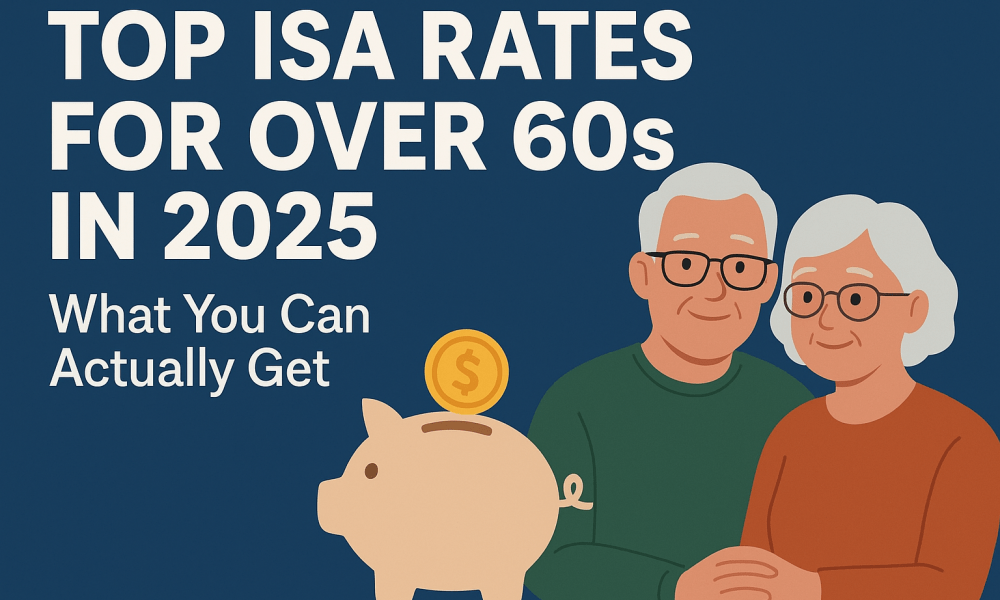Top ISA Rates for Over 60s in 2025 – What You Can Actually Get
If you’re over 60 and looking to make your savings work harder, here’s what you need to know about best ISA rates for over 60s in October 2025. Whether you’re chasing safety, a steady income, or tax-free interest, this guide will walk you through what’s available (and what to watch out for) in the UK market right now.
Why ISA Rates Matter More After 60
When you’re pushing into retirement or already there, priorities shift. You may:
- Rely more on your capital (not just income).
- Want lower risk and more certainty.
- Need tax-efficient returns, especially as investment income or dividends may push you into higher tax brackets.
- Prefer simplicity and predictability over chasing speculative gains.
An ISA (Individual Savings Account) lets you earn tax-free interest (for cash ISAs) or tax-free growth/dividends (for stocks & shares ISAs). For many over-60s, cash ISAs are a go-to: safer, predictable, and no risk of market volatility.
But just having an ISA isn’t enough—you want one paying a solid rate. Even a small difference (say 0.5 % vs 4 %) can add up when your sums are larger.
How ISA Rules Apply to Over 60s
Before you leap into rate hunting, here’s a refresher on ISA rules—especially those that may affect you now:
- Annual allowance: In the 2025/26 tax year, you can put up to £20,000 (across all ISAs) without paying tax on interest or gains. MoneySavingExpert.com+2Which?+2
- New vs existing ISA: You can open a new ISA or transfer existing ISA funds into a new one. Transfers preserve the tax status (don’t withdraw and re-deposit).
- Multiple ISAs: Since April 2024, rules allow multiple ISAs of the same type within a tax year (for example, more than one cash ISA) if the provider allows it. But many institutions haven’t implemented this yet. The Guardian
- Fixed vs flexible vs easy-access: Some ISAs lock in your money (fixed), some let you withdraw freely (easy-access), and some are in between (notice or limited-access).
- Penalties / early closure: Fixed ISAs may impose charges (or loss of interest) if you withdraw early. Always check the “early closure rules.”
- FSCS protection: Up to £85,000 of your savings per financial institution (bank or building society) is protected under the Financial Services Compensation Scheme (FSCS).
- No age limit: There is no maximum age for holding or opening ISAs, so “over 60” savers have the same rights as younger people in general.
Because there is no ISA that is specifically for “over 60s”, your task is to find the best ones that match your needs (access, rate, term), not some special senior-only product.
Current Landscape: Best ISA Rates for Over 60s (Oct 2025)
Here’s a snapshot (as of October 2025) of some of the top cash ISAs you might consider. Rates change often; this is a starting point, not a guarantee.
| Provider / Account | Type / Term | Approx Rate (AER) | Minimum Deposit / Notes | Key Features / Limitations |
|---|---|---|---|---|
| Plum Cash ISA | Easy access / variable | ~4.37% (includes bonus) MoneyWeek+1 | low / mobile app | Good flexibility, but watch bonus expiry |
| Trading 212 Cash ISA (promo) | Easy access / variable + bonus | ~4.51% including bonus Moneyfactscompare+1 | £1 | Attractive promo, check terms |
| Harpenden BS Online Single Access ISA | Easy (single access) | 4.31% AER MoneyWeek+1 | low / online | Solid “single access” style |
| Tembo (1-year fixed) | Fixed (1 year) | 4.27% AER MoneyWeek+1 | £500 | Good 1-year fix |
| NatWest (Fixed Rate ISA) | Fixed (1 or 2 years) | 4.20% (1 year) / 4.00% (2 years) NatWest+1 | £1,000 | Known brand, well understood terms |
| Coventry Building Society (Fixed) | Fixed to 30 Sep 2026 | 4.12% coventrybuildingsociety.co.uk | £1 | Longer fixed term (roughly ~1 year) |
| UBI UK (5-year fixed) | Fixed (5 years) | 4.22% AER Moneyfactscompare | depends on issue | For funds you won’t need for years |
| Nationwide (Fixed Rate Cash ISA) | Fixed (term) | 3.80% AER Nationwide | — | More conservative offer from major name |
Notes / caveats:
- Many of the “top” rates include bonus interest (i.e. a higher rate for a limited period, then reverts down). Always check how long the bonus holds.
- Fixed ISAs usually restrict adding money after a short window and impose penalties for early withdrawal.
- Ease of access is lower in fixed options—if you need the cash unexpectedly, you might incur losses.
- Rates are variable for non-fixed ISAs, so they can go down (or up).
- Some of the “best” offers (e.g. via apps or promos) might have restrictions (e.g. only for new customers).
As a ballpark: you can reasonably expect 4.0% to 4.5% AER in decent fixed-term ISAs, and ~4.2%–4.5% in top variable / bonus ISAs—though sustainable rates will often be a bit lower.
Top 3–5 Picks & Who They Suit
Here’s how I’d pick based on common priorities for over 60s:
| Goal / Priority | Recommended Option | Why & What to Check |
|---|---|---|
| Best easy access / flexibility | Plum Cash ISA or Trading 212 Cash ISA (promo) | You get nearly top-tier rates with ability to withdraw (though check how “easy” it really is, bonus expiry, etc.). |
| Best 1-year fixed (low term risk) | Tembo 1-year fixed | Locks interest for a year, with relatively modest commitment. |
| Best major-brand fixed | NatWest Fixed Rate ISA (1-year at 4.20%) | If you prefer a familiar name and stable terms, this is solid. |
| Longer-term lock, higher rate | UBI UK 5-year fixed | If you’re comfortable locking in for 5 years and don’t expect to need that cash. |
| Mid-term fixed, moderate risk | Coventry Building Society fixed to 2026 | Good compromise of yield and term length. |
One example: if you put £100,000 into a 1-year fixed ISA paying 4.20%, you’d get ~£4,200 in interest (tax free). Over 2 years at 4.00%, you’d get ~£8,160 (non compounding for simplicity). Always run your own numbers factoring compounding, early withdrawal, etc.
Key Considerations & Pitfalls
Before you jump in, here are things to watch for:
- Inflation risk
If inflation is, say, 3%+, then a 4% rate gives you “real” return only ~1%. Doesn’t make it bad—but be realistic. - Rate cuts
Variable ISAs can drop rates quickly. Fixed locks that risk but loses flexibility. - Bonus expiry / reversion
Some accounts offer an attractive rate only if you meet conditions or only for a period (e.g. first 12 months). After that, the rate may drop sharply. - Early withdrawal penalties
Fixed ISAs may impose interest forfeiture or closure penalties if you withdraw before maturity. - Deposit limits & sub-limits
Some ISAs only accept deposits up to a certain limit. Some fixed ISAs only let you deposit in a narrow window after opening. - Provider credibility & FSCS limits
Stick to regulated banks/building societies with FSCS protection. If you have more than £85,000 per provider, split your funds. - Switching hassle / transfer rules
Always use the ISA transfer process (not withdrawing & redepositing) to retain tax status. Some providers restrict how often or when you can transfer. - Tax “cliffs” or extra income
If you have other income (pension, dividends), large interest incomes can push you into higher tax brackets—even though ISAs are tax-free—but watch how size of pot and “income” layering might affect your strategy. - Changing regulations
Tax rules, ISA rules, or interest rate environments can change. What’s safe or optimal today may not be tomorrow.
How to Choose the Right ISA for You (Checklist)
Here’s a little checklist you can run against any ISA you’re considering:
- What’s your time horizon? Do you expect to need the money within 1–2 years, or can you lock it away longer?
- How much access do you want? If you may need to dip in, avoid overly restrictive fixed accounts.
- What minimum deposit is required? Make sure you can meet it (some fixed ISAs demand £1,000+).
- What happens on maturity / end of term? Will your ISA roll into a lower rate automatically? Will you need to choose anew?
- What’s the early withdrawal policy? For fixed ISAs, check penalties or interest loss.
- Is the provider reliable and FSCS-protected? Don’t chase a rate from a tiny unknown with weak credentials.
- Does the ISA allow further contributions post-opening? (Some fixed ISAs only let you deposit for a short window.)
- What’s the bonus structure? When does it expire? What conditions must you meet?
- Does the rate beat likely inflation? If not, your “gain” might be illusory in real terms.
- Can you spread risk? If you have significant sums, you might use a mix: some in fixed, some in flexible.
How to Stay Updated and Adjust Strategy
Because interest rates move, and providers come and go, here’s how to stay on top:
- Regularly check ISA comparison websites (Moneyfacts, MoneySavingExpert, Which?)
- Keep a table or spreadsheet of your current ISAs: provider, rate, expiry / maturity, key terms.
- Set reminders for when fixed ISAs mature to shop around—not let them drop to low “standard variable” rates by default.
- Be open to partial transfers or “laddering” (staggering fixed ISAs with overlapping maturity dates) to manage interest rate risk.
- If a new rate boost appears, see if transferring is worth it (account for any penalty or forfeiture from your current ISA).
- Consult a financial adviser particularly if you have large sums or complex tax/income situations.
Conclusion & Call to Action
If you’re over 60, the “best ISA rates” are absolutely worth chasing—with shape, care, and an eye on both yield and flexibility. In October 2025, you can still find decent deals: 4 %+ fixed rates, and ~4.2–4.5 % on top-tier variable/bonus ISAs. The trick is picking the ones that suit your timeframe, need for access, and risk appetite.
Here’s what you can do now:
- Audit your current savings—what ISAs you hold, what rates, when they mature.
- Using the comparison table above, shortlist 2–3 ISAs that match your needs.
- Run the numbers (how much interest you’ll get, penalty on early withdrawal, etc.).
- If a fixed ISA is about to mature, shop around before it rolls into a lower rate.
- If in doubt, talk to an independent financial adviser—especially if you hold large sums or have multiple income sources.
And one gentle reminder: always check the small print. A headline rate is nice—but the conditions, early withdrawal rules, bonus expiry, and provider reliability make the real difference.
Let me know if you want help comparing two specific ISA offers or running scenarios for your own savings. Happy to dig in with you.
Related Reading
- Skipton Building Society ISA Rates – See the latest rates and terms for 2025.
- Lloyds ISA 2025 Overview – Compare interest and transfer options.
- Halifax ISA – Discover fixed vs flexible ISAs.
- Virgin Money ISA – See if their 2025 ISA suits your savings goals.
- Nationwide ISAs August 2025 – Compare rates and find top choices.
- Transferring Cash ISA to Stocks & Shares – A step-by-step transfer guide.






